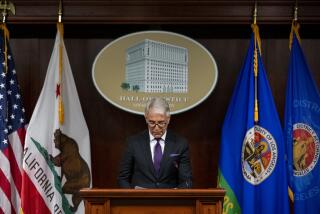FBI Analysts Faulted in Arrest of Portland Lawyer
- Share via
PORTLAND, Ore. — A Portland lawyer was wrongly linked to the Madrid train bombings because a high-ranking FBI supervisor bungled a fingerprint examination and two of his colleagues were afraid to contradict him, a panel of forensic experts found.
The conclusion showed that human error played a larger role than originally thought in the botched investigation.
The FBI had said a hazy and low-resolution fingerprint image caused authorities to connect lawyer Brandon Mayfield to the March 11 terrorist attack that killed 191 people.
Mayfield, a convert to Islam, was arrested in May after the FBI said his fingerprint was found on a bag of detonators in Madrid.
He was held for two weeks before being released.
The report concluded that the FBI analyst who was first asked to examine the fingerprint was influenced by “the inherent pressure of working an extremely high-profile case.” He also felt pressured because the FBI’s database had spit out Mayfield’s name as the fourth most likely candidate matching the print, the report said.
Once the first examiner -- described as a “highly respected supervisor with many years’ experience” -- made up his mind, the other two analysts did not dare challenge him, the report said.
“To disagree was not an expected response,” said Robert Stacey, author of the final report, published this month in the Journal of Forensic Identification.
Agent Ann Todd, a spokeswoman for the FBI Laboratory in Virginia, said the agency had created eight teams of scientists to address the panel’s concerns.
The FBI issued a rare public apology after Mayfield’s release -- but maintained the error was due to the low resolution of the print.
Mayfield is suing the government, alleging he was singled out because of his Muslim faith.
More to Read
Sign up for Essential California
The most important California stories and recommendations in your inbox every morning.
You may occasionally receive promotional content from the Los Angeles Times.













